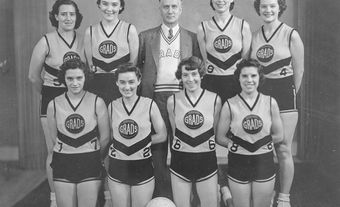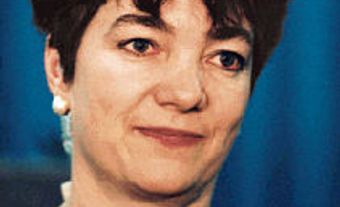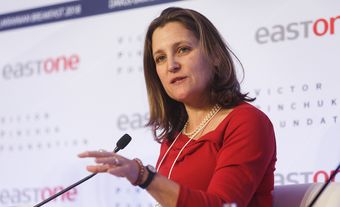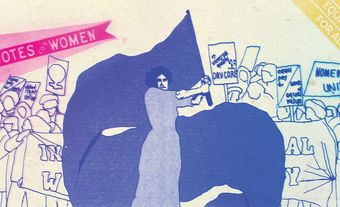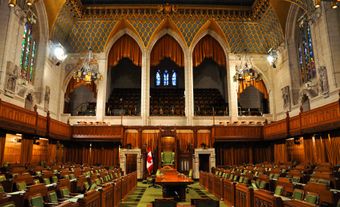Avril Phaedra Douglas Campbell, PC, CC, QC, OBC, lawyer, professor, politician, Canada’s prime minister 25 June 1993 to 3 November 1993, diplomat, global advocate for education, democracy and women’s issues (born 10 March 1947 in Port Alberni, BC). Kim Campbell became Canada's first — and still only — female prime minister when she assumed the leadership of the Progressive Conservative Party following Brian Mulroney's resignation. She was also Canada’s first female justice minister and attorney general; Canada’s first female minister of national defence and of veterans affairs; the first woman to represent a member country at a NATO meeting; and the first prime minister from British Columbia. She has received the Order of British Columbia and numerous honorary degrees and is a Companion of the Order of Canada.

Education and Early Life
Avril Phaedra Campbell was born in Port Alberni, on Vancouver Island, in 1947. At age 12, her parents divorced; she and her sister, Alix, then lived with her father, a Vancouver lawyer. It was also around this time that she decided to drop her "unusual" name and instead go by Kim.
Campbell served as the first female student council president at Prince of Wales Secondary School in Vancouver. She competed on the school's Reach for the Top team and was valedictorian when she graduated in 1964. In 1969, she earned a political science degree at the University of British Columbia (UBC), where she again served in student government. She then pursued doctoral studies at the London School of Economics and Political Science (1970–73), specializing in the government of the Soviet Union.
Personal Life
Campbell married her first husband, UBC math professor Nathan Divinsky, in London, England, in 1972. They separated in 1982. She married her second husband, Victoria lawyer Howard Eddy, In 1986. Since 1997, she has been in a common-law union with actor, playwright and concert pianist Hershey Felder.
Teaching Career
Upon her return to Canada, Campbell began lecturing in political science. She taught at UBC from 1975 to 1978 and at Vancouver Community College from 1978 to 1981. (See also Community College.)
Early Political Career
While enrolled at UBC law school, Campbell was twice elected to the Vancouver School Board. (See also School Boards.) She served as a trustee from 1980 to 1984 and was chair in 1983. She also ran as a Social Credit candidate in the 1983 provincial election but lost.
Campbell began her law career with the firm Ladner Downs. She became widely known through regular appearances on the nationally broadcast CBC Radio program Morningside. From 1985 to 1986, Campbell was the executive director in the office of British Columbia premier Bill Bennett. In June 1986, she launched an unsuccessful bid to become British Columbia’s Social Credit party leader.

BC MLA
In October 1986, Campbell was elected to the provincial legislature as the Social Credit MLA representing Vancouver-Point Grey. Her efforts as an effective backbencher led to changes that rendered the province’s Health Act less discriminatory to the gay community. She also chaired a task force that created a new Heritage Act, which was later passed by an NDP government. In 1988, the pro-choice Campbell vehemently opposed British Columbia’s Social Credit premier Bill Vander Zalm’s opposition to abortion. She later questioned his integrity on an unrelated issue. Her principled stands resulted in her leaving the party and resigning her seat in the legislature on 22 October 1988.
Member of Parliament and Cabinet
Campbell joined the federal Progressive Conservative Party immediately after leaving the Social Credit party. In November 1988, she won election to the House of Commons representing the riding of Vancouver Centre. In 1989, Prime Minister Brian Mulroney appointed her minister of state for Indian Affairs and Northern Development (now Crown-Indigenous Relations and Northern Affairs Canada).
In 1990, Campbell became Canada’s first female justice minister and attorney general. She introduced reform legislation on various issues, including affording women more protection in cases of rape and sexual assault. She also served on the influential Cabinet Committee on Priorities and Planning and was the minister responsible for British Columbia.
In a January 1993 Cabinet shuffle, Campbell became Canada’s first female minister of national defence and minister of veterans affairs. She was also the first woman to represent a member country at a NATO meeting.
Party Leader and Prime Minister
By November 1992, Brian Mulroney's popularity was at 12 per cent — the lowest of any prime minister in Canadian history. (See also Public Opinion.) With a federal election due In late 1993, Mulroney announced his resignation in February 1993. Campbell entered the race to succeed him at the party's leadership convention as the front-runner. She won on the second ballot on 13 June, defeating Jean Charest. On 25 June 1993, at age 46, Campbell was sworn in as Canada’s 19th prime minister. She was the first woman and the first British Columbian to become prime minister.
The Progressive Conservative Party had won a second consecutive majority in the House of Commons in the 1988 election. But by 1993, the country's political landscape had changed dramatically. The coalition of Western conservatives and Quebec nationalists that had made up the lion's share of that majority had fractured into the Reform Party and the Bloc Québécois, respectively. Both parties siphoned significant support from the Conservatives. Furthermore, there was great bitterness among many Canadians regarding the Mulroney government’s failed attempts to amend the constitution (the Meech Lake Accord and Charlottetown Accord); the implementation of the highly unpopular goods and services tax (GST); the signing of a free trade agreement with the United States and another involving Canada, the US and Mexico that became NAFTA; and a stubborn recession that was causing high unemployment. Campbell was popular (an August 1993 Gallup poll had her approval rating at "51 per cent — the highest level for a prime minister in 30 years”). However, her party and government were not.
Campbell amalgamated government departments to reduce the size of the cabinet from 35 to 23. She met with provincial premiers and attended a G-7 summit meeting in Tokyo, where she defended Canada’s cultural industry. She travelled across Canada making policy announcements. In September, she announced that the federal election would be held on 25 October.
1993 Federal Election
Problems arose on the campaign’s first day. In an accurate but complex analysis of current economic challenges, Campbell said that unemployment would remain high until the turn of the century. She later answered a reporter’s question about social programs by saying, “This is not the time, I don’t think, to get involved in a debate on very, very serious issues.” The media and many Canadians interpreted her statement to mean that she was secretly planning to cut social programs. It was a turning point. Support for Campbell and her party plummeted. The downward trend became worse when outrage greeted a Progressive Conservative television ad that appeared to mock the partial paralysis of Liberal leader Jean Chrétien’s face. Campbell had not sanctioned the ad (it was approved by her campaign chairman, John Tory) and ordered it be withdrawn. But significant political damage was done.
On 25 October 1993, the Progressive Conservative Party suffered the worst electoral defeat in Canadian history. Chrétien’s Liberals won a majority with 177 seats; the Bloc Québécois became the official opposition with 54 seats; the Reform Party won 52; and the NDP won 9 (there was also one independent). Though more than 2 million Canadians had voted for Progressive Conservative candidates — 16 per cent of the electorate, compared to 13.5 per cent for the Bloc — the party was reduced to only two seats and lost official party status in the House of Commons. Campbell also lost her seat in Vancouver Centre.
Only Sir Charles Tupper (69 days) and John Turner (79 days) served as Canada's prime minister for shorter periods of time than Campbell (123 days). On 13 December 1993, six months to the day after becoming Progressive Conservative Party leader, she resigned.
Post-Politics
Campbell continued to serve Canada. From 1996 to 2000, she was Canada’s consul general in Los Angeles. (See Diplomatic and Consular Representations.) She also chaired Canada’s Independent Advisory Board for Supreme Court of Canada Judicial Appointments in 2016 and in 2017. (See Supreme Court of Canada.)
In 2001, Campbell helped found the Club de Madrid. The non-profit organization comprises former presidents and prime ministers and promotes democracy around the world. She was its secretary general from 2004 to 2006 and continues to serve on its board. From 2008 to 2015, Campbell chaired the steering committee for the World Movement for Democracy.
Campbell continues to advocate for women. (See also Women's Movements in Canada; Women's Organizations.) Her efforts have included board membership or leadership roles in non-profit organizations such as the Council of Women World Leaders and the International Women’s Forum, where she was president from 2003 to 2005.
Campbell remains devoted to education. She taught at the John F. Kennedy School of Government at Harvard University from 2001 to 2004. She is a trustee of the International Centre for the Study of Radicalisation at King’s College in London. She was also the founding principal of the University of Alberta’s Peter Lougheed Leadership College from 2014 to 2018. (See also Peter Lougheed.) Campbell is a popular speaker and has addressed audiences around the world on a host of subjects. She also serves on various public advocacy boards.
See also Elections and Prime Ministers Timeline.
Honours
- Woman of Distinction Award, YWCA Vancouver (1994)
- Woman of the Year, Chatelaine Magazine (1994)
- Queen Elizabeth II Golden Jubilee Medal (2002)
- Companion, Order of Canada (2008)
- Achievement Award of Distinction, UBC Alumni Association (2008)
- Award of Excellence, Churchill Society (2008)
- Inductee, International Women's Forum Hall of Fame (2008)
- Order of British Columbia (2012)
- Queen Elizabeth II Diamond Jubilee Medal (2012)
- Lifetime Achievement Award, Women in Law Leadership (2015)
- Icon Award, Vancouver Metro YWCA (2018)
- Lifetime Achievement Award, Peter Allard School of Law Alumni Association, University of British Columbia (2018)
- Lifetime Achievement Award, Global Woman of Vision (2018)
Honorary Degrees
- Doctor of Laws (LLD), Law Society of Upper Canada (1991)
- Doctor of Laws (LLD), Brock University (1998)
- Doctor of Laws (LLD), University of British Columbia (2000)
- Doctor of Laws (LLD), University of Alberta (2010)
- Doctor of Laws (LLD), Trent University (2011)
- Doctor of Laws (LLD), Simon Fraser University (2014)
- Doctor of Civil Laws (DCL), Acadia University (2018)

 Share on Facebook
Share on Facebook Share on X
Share on X Share by Email
Share by Email Share on Google Classroom
Share on Google Classroom

